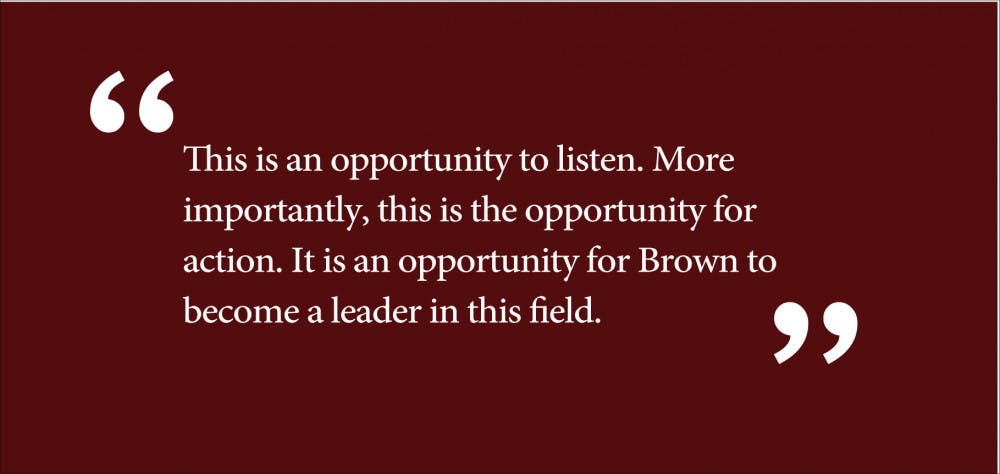At an event hosted by the School of Public Health Wednesday night, Michelle Forcier, professor of pediatrics and associate dean of medicine at the Alpert Medical School, posed a pertinent question: “How many people in this room experience gender?” Everyone in the room raised their hands. “So wouldn’t you say that’s primary care?” Forcier responded. “To not know this care, at this point in time, is not okay,” she added.
The panel discussion, “Trans Voices in Trans Research: Envisioning a Trans-Centered Public Health Research Agenda,” featured three professionals in the field of trans health — Forcier; Laura Jacobs, psychotherapist, activist and author; and Dr. Scout, vice president of social justice at The Torvus Group. According to Don Operario, associate dean for academic affairs at the School of Public Health, one of the factors that prompted the event was “the call from our students to respond to one of the articles published by our faculty members.”
A study authored by Lisa Littman, assistant professor of the practice of behavioral and social sciences in the School of Public Health, defined a phenomenon called “rapid-onset gender dysphoria” which “is observed to begin suddenly during or after puberty in an adolescent or young adult who would not have met criteria for gender dysphoria in childhood,” according to the study. Littman suggested that “rapid-onset gender dysphoria” spreads as “social contagion.” The study, published in August, was met with widespread media attention and criticism over its methodology and conclusions, and the University removed the associated press release from its website and news distribution, The Herald previously reported.
Operario added that the purpose of the panel discussion was to work alongside the University’s process to “reaffirm our commitment to health equity and to the wellness of the trans population and to reaffirm our commitment to academic freedom, to the best quality and actually applying our science to help uplift the wellness of all communities,” he said.
Jacobs spoke about the importance of authenticity and representation in scientific research. She emphasized the importance of increasing accountability for researchers and spokespersons whose values are antithetical to the values of the trans community. Jacobs explained that the limit to academic freedom is academic dishonesty, poor methodology or studies coming from a place of stigma. “Research doesn’t just live in academia. Harmful research causes harm. It makes it harder for people to get care. That means they live more difficult lives,” Jacobs added.
Forcier also spoke about the ways in which trans youth should be supported by their parents. “Data says there is a huge importance of family and community support and acceptance. And this support and acceptance is associated with positive health outcomes,” she said. Forcier also stressed the importance of language and paradigms by citing a study suggesting that using children’s chosen name and pronouns can protect against suicidality. “Everybody takes a different path to gender and we need to respect those different paths,” she added.
Scout focused on the need for systematic changes in institutes as “problematic research structures can create problematic findings.” He looked at the progress of the National Institutes of Health, which could be a model for the University, he said, noting some of the improvements made by the NIH to diversify their employee pool. He emphasized the importance of involving trans people in research about their communities and observed how the NIH had “a special meeting of external trans experts to come in and tell them what the research priorities were,” he said. “This is an opportunity to listen. More importantly, this is the opportunity for action. It is an opportunity for Brown to become a leader in this field,” Scout added.
Laura Sobik, clinical psychologist and assistant director of Counseling and Psychological Services, attended the event and described the speakers as phenomenal advocates and leading voices in trans equity and social justice who were “speaking for those who don’t have or cannot use their voice.” Following the publication of the research that was referenced in the event, many psychologists at CAPS “have been working with students who have been personally or collectively harmed and in pain because of it,” Sobik added.





